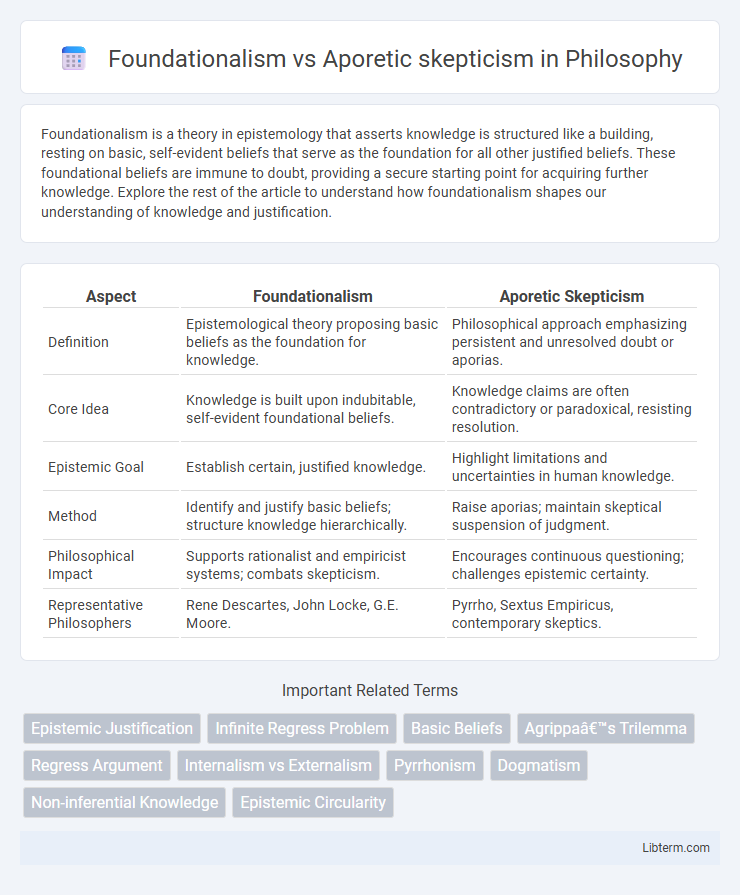Foundationalism is a theory in epistemology that asserts knowledge is structured like a building, resting on basic, self-evident beliefs that serve as the foundation for all other justified beliefs. These foundational beliefs are immune to doubt, providing a secure starting point for acquiring further knowledge. Explore the rest of the article to understand how foundationalism shapes our understanding of knowledge and justification.
Table of Comparison
| Aspect | Foundationalism | Aporetic Skepticism |
|---|---|---|
| Definition | Epistemological theory proposing basic beliefs as the foundation for knowledge. | Philosophical approach emphasizing persistent and unresolved doubt or aporias. |
| Core Idea | Knowledge is built upon indubitable, self-evident foundational beliefs. | Knowledge claims are often contradictory or paradoxical, resisting resolution. |
| Epistemic Goal | Establish certain, justified knowledge. | Highlight limitations and uncertainties in human knowledge. |
| Method | Identify and justify basic beliefs; structure knowledge hierarchically. | Raise aporias; maintain skeptical suspension of judgment. |
| Philosophical Impact | Supports rationalist and empiricist systems; combats skepticism. | Encourages continuous questioning; challenges epistemic certainty. |
| Representative Philosophers | Rene Descartes, John Locke, G.E. Moore. | Pyrrho, Sextus Empiricus, contemporary skeptics. |
Introduction to Foundationalism and Aporetic Skepticism
Foundationalism asserts that knowledge is built upon indubitable basic beliefs serving as a secure foundation for all other beliefs. Aporetic skepticism highlights persistent philosophical puzzles and contradictions that challenge the possibility of achieving certain knowledge. This skepticism exposes the limits of foundationalism by questioning whether any beliefs can be truly self-evident or immune to doubt.
Historical Roots and Philosophical Origins
Foundationalism traces its roots to Aristotle and Descartes, emphasizing basic beliefs as the secure foundation for knowledge. Aporetic skepticism originates from ancient Greek philosophers like Pyrrho and Sextus Empiricus, highlighting the persistent contradictions and difficulties that challenge knowledge claims. These historical origins shape foundationalism's confidence in certain truths versus skepticism's focus on irresolvable doubt.
Core Principles of Foundationalism
Foundationalism asserts that knowledge is built upon basic, self-evident beliefs that serve as a secure foundation for all other beliefs, emphasizing certainty and coherence within this structure. These foundational beliefs are indubitable, providing an epistemic anchor that prevents infinite regress in justification. Core principles include the distinction between foundational and derived beliefs, as well as a hierarchical organization where non-foundational beliefs depend on the justification of foundational ones.
Understanding Aporetic Skepticism
Aporetic skepticism challenges the possibility of achieving certain knowledge by emphasizing persistent doubt and unresolved contradictions in epistemic inquiry. It contrasts with foundationalism, which seeks indubitable basic beliefs as the secure foundation for knowledge structures. Understanding aporetic skepticism involves recognizing its role in highlighting epistemic limits and provoking continuous philosophical reflection on certainty and justification.
Contrasting Epistemological Approaches
Foundationalism asserts that knowledge is built upon indubitable basic beliefs that serve as a secure foundation for all other beliefs, emphasizing certainty and structured justification. Aporetic skepticism, in contrast, highlights persistent epistemic puzzles and contradictions, arguing that such challenges prevent the attainment of absolute knowledge and necessitate withholding judgment. These contrasting epistemological approaches reveal a fundamental divide between the pursuit of secure, foundational knowledge and the acknowledgment of irresolvable epistemic dilemmas.
Key Arguments Supporting Foundationalism
Foundationalism asserts that knowledge is structured upon indubitable basic beliefs that provide a secure foundation for further justified beliefs, emphasizing the necessity of self-evident or infallible propositions. Key arguments supporting foundationalism highlight its ability to avoid infinite regress by grounding beliefs in basic, non-inferential knowledge, which aporetic skepticism questions due to the challenge of establishing such certainties. Foundationalism further relies on the clarity and immediacy of sensory experience or rational intuition as reliable sources of foundational beliefs, contrasting with skepticism's emphasis on persistent doubt and unresolved paradoxes.
Critical Challenges from Aporetic Skepticism
Aporetic skepticism presents critical challenges to foundationalism by highlighting persistent, irresolvable contradictions in epistemic justification that undermine the certainty of basic beliefs proposed by foundationalists. Through its method of inducing epistemic aporias, skeptics expose the circularity, regress, or arbitrariness in foundationalist attempts to establish secure starting points for knowledge. This skepticism calls into question the possibility of achieving absolute justification, pressing foundationalists to address the problem of infinite regress and the criteria for distinguishing properly basic beliefs from arbitrary assumptions.
Responses and Counterarguments
Foundationalism asserts that knowledge is built on indubitable basic beliefs, countering aporetic skepticism by emphasizing self-evident or non-inferential justifications. Responses to aporetic skepticism challenge its demand for absolute certainty, arguing that knowledge can be sufficiently supported without eliminating all doubt. Critics of foundationalism highlight the problem of infinite regress, prompting revised models like coherentism or modest foundationalism to address skepticism more effectively.
Implications for Modern Epistemology
Foundationalism asserts that knowledge rests on indubitable basic beliefs, providing a stable structure for epistemic justification, whereas Aporetic skepticism highlights persistent epistemic puzzles that challenge such certainty, exposing the limits of human cognition. The tension between foundationalist certainty and aporetic doubt shapes modern epistemology by stimulating debates on the nature of justification, the possibility of knowledge, and the role of epistemic humility. These implications encourage the development of coherentist and contextualist theories that accommodate uncertainty while seeking reliable knowledge frameworks.
Conclusion: The Ongoing Debate
Foundationalism asserts that certain basic beliefs provide a secure foundation for knowledge, while aporetic skepticism highlights unresolved contradictions that challenge the possibility of absolute certainty. The ongoing debate persists as philosophers weigh the reliability of indubitable beliefs against the perpetual difficulties in justifying knowledge claims. This dialogue continues to shape epistemological theories and the understanding of rational inquiry.
Foundationalism Infographic

 libterm.com
libterm.com